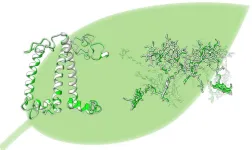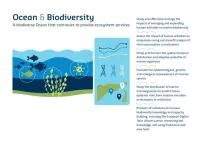(Press-News.org) Researchers from the University of Oxford have identified a key biochemical mechanism relevant to the development of Huntington’s Disease. This discovery opens up the possibility of studying the disease before its clinical onset and eventually stopping its progression.
The study, published in Nature Metabolism, has shown for the first time the biochemical change responsible for the development of Huntington’s disease, and how blocking this change stopped disease progression.
Huntington's disease is an inherited condition that stops parts of the brain from working properly, leading to mental and physical decline that slowly worsens over time. The symptoms usually begin to appear after the age of 30 years and are fatal, but this can be after a period of up to 20 years, during which they worsen.
The study explores how an early change described in the brain of HD patients in the early 1980s could lead to Huntington's disease onset. The researchers identified that problems with specific neurons in the brain, called indirect pathway spiny projection neurons (iSPNs), which are the initially affected cells in HD, may trigger an imbalance in dopamine levels upon missing an important signalling derived from the activation of the neurotrophin receptor TrkB. This imbalance is linked to early symptoms of the disease, such as abnormal, involuntary movements.
First the researchers looked at mice that lacked normal function in these iSPNs due to disrupted TrkB neurotrophin signalling and noticed that they showed increased levels of dopamine in the brain, leading to hyperactivity. This change occurred before noticeable symptoms appeared, suggesting that these early alterations may contribute significantly to HD progression.
The researchers also found that a protein called GSTO2, an enzyme that is part of the glutathione metabolism, plays an important role in regulating dopamine levels. By selectively reducing the activity of this protein in mice, the researchers were able to prevent dopamine and energy metabolism dysfunction, arresting the onset of motor symptoms in mice.
Importantly, this enzyme shows similar dysregulation in a rat model of HD and some rare brains of asymptomatic HD patients, confirming its putative relevance to the development of the disorder.
The study’s lead author, Liliana Minichiello, Professor of Cellular and Molecular Neuroscience at Oxford’s Department of Pharmacology, said: ‘The big problem with Huntington’s disease is that by the time that symptoms develop much of the damage has already been done, and therefore, it is fundamental that we understand the changes that occur before the disorder develops if we are to develop effective therapeutics.’
‘This research marks the first time that we have been able to identify a specific chemical change that is unique to the development of Huntington’s disease, which opens the possibility of developing new tests to study the early changes of the disease before irreversible damage occurs.
‘Understanding these early changes provides crucial insights into how Huntington’s Disease develops, and this knowledge could help develop preventive therapies to maintain dopamine balance and delay or halt disease progression.’
Dr Yaseen Malik (Department of Pharmacology, Oxford University), first author of the paper, said: ‘Despite our significant understanding of its pathophysiology, HD remains without a cure, which underscores the necessity of delivering diagnostic and therapeutic interventions prior to the onset of symptoms, and this study is a step in that direction.’
AMS TAGS: PEER-REVIEWED, EXPERIMENTAL STUDY, PEOPLE & MICE
Notes to editor:
The paper, 'Impaired striatal glutathione–ascorbate metabolism induces transient dopamine increase and motor dysfunction', will be published in Nature Metabolism at 10:00 UK time / 6:00 US Eastern Time Monday 28 October 2024.
DOI: 10.1038/s42255-024-01155-z
https://www.nature.com/articles/s42255-024-01155-z
For further information and interviews with the article author, please contact:
Caroline Wood, Communications Manager (Research & Innovation)
caroline.wood@admin.ox.ac.uk
About the University of Oxford
Oxford University has been placed number 1 in the Times Higher Education World University Rankings for the ninth year running, and number 3 in the QS World Rankings 2024. At the heart of this success are the twin-pillars of our ground-breaking research and innovation and our distinctive educational offer.
Oxford is world-famous for research and teaching excellence and home to some of the most talented people from across the globe. Our work helps the lives of millions, solving real-world problems through a huge network of partnerships and collaborations. The breadth and interdisciplinary nature of our research alongside our personalised approach to teaching sparks imaginative and inventive insights and solutions.
Through its research commercialisation arm, Oxford University Innovation, Oxford is the highest university patent filer in the UK and is ranked first in the UK for university spinouts, having created more than 300 new companies since 1988. Over a third of these companies have been created in the past five years. The university is a catalyst for prosperity in Oxfordshire and the United Kingdom, contributing £15.7 billion to the UK economy in 2018/19, and supports more than 28,000 full time jobs.
END
Discovery of key mechanism in Huntington’s Disease could pave the way for early detection and treatment
2024-10-28
ELSE PRESS RELEASES FROM THIS DATE:
Humans and AI: Do they work better together or alone?
2024-10-28
The potential of human-AI collaboration has captured our imagination: a future where human creativity and AI's analytical power combine to make critical decisions and solve complex problems. But new research from the MIT Center for Collective Intelligence (CCI) suggests this vision may be much more nuanced than we once thought.
Published today in Nature Human Behaviour, “When Combinations of Humans and AI Are Useful” is the first large-scale meta-analysis conducted to better understand when human-AI combinations are useful in task completion, and when they are not. Surprisingly, the research has found that combining humans and AI to ...
Childhood attention issues and genetic factors may predict psychosis risk
2024-10-28
Researchers at UCLA Health have found that a person's risk of developing psychotic-like experiences may be influenced by both childhood attention problems and their genetic makeup.
The findings, published in Nature Mental Health, build upon a long-studied association between childhood attention problems and the likelihood of later developing schizophrenia. Using data from about 10,000 children over six years, UCLA researchers led by Dr. Carrie Bearden sought to determine how attentional variability ...
Amsterdam UMC study proves impact of rapid first shock after cardiac arrest
2024-10-28
It is well known that acting quickly in the event of a cardiac arrest is important, but what does a quick initial shock with a defibrillator mean exactly for patients' chances of survival? Researchers from Amsterdam UMC analysed the data of 3723 patients who had a cardiac arrest outside the hospital and concluded that for the first shock, every minute reduces the chance of survival by 6%. The results of this research were published today in the international journal Circulation.
"Our research shows that every minute of delay in giving the first shock has a major impact. If the first shock was given within six minutes, it was possible ...
Children’s BMI can affect their future lung function
2024-10-28
An abnormal BMI in children – be it high or low – can now be associated with impaired lung function, but if their BMI is normalised before they reach adulthood, the impairment can be offset, researchers from Karolinska Institutet report. Their results, which are based on data collected under the BAMSE project in Sweden, are presented in The European Respiratory Journal.
One in ten people have reduced lung function development in childhood and cannot achieve maximal lung capacity in adulthood, increasing the risk of serious health problems such as cardiovascular disease, lung disease and diabetes. One risk factor associated with impaired lung function development is abnormal ...
Don't worry. Study shows you're likely a more creative writer than ChatGPT. For now
2024-10-28
Imagine you decide to write a short story about a protagonist who creates an artificial human and then falls in love with it. What gender is your protagonist? What about the artificial human? Would you write a moving love story? A cautionary dystopian tale?
Would your story be more compelling than one written by ChatGPT?
Likely yes, says Nina Beguš, a researcher and lecturer in UC Berkeley's School of Information and Department of History. Leveraging her background in comparative literature ...
Heart failure mortality declining in Sweden
2024-10-28
A new study from Karolinska Institutet shows that heart failure mortality has decreased in Sweden over the last 20 years. The study has been published in the European Journal of Heart Failure.
A national study has shown that heart failure mortality has decreased in Sweden over the last two decades. Despite these improvements, the prognosis for heart failure patients remains worrying – 25 percent of those diagnosed in 2022 died within a year.
“Our results suggest that advances in heart failure treatment over the past decades have reduced heart failure mortality, both at the population level and for individual patients. ...
Understanding how mutations affect diseases
2024-10-28
Many statistical models and algorithms used by scientists can be imagined as a “black box.” These models are powerful tools that give accurate predictions, but their internal workings are not easily interpretable or understood. In an era dominated by deep learning, where an ever-increasing amount of data can be processed, Natália Ružičková, a physicist and PhD student at the Institute of Science and Technology Austria (ISTA), chose to take a step back. At least in the context of genomic ...
Quality control in artificial photosynthesis: validating natural antenna mimicry
2024-10-28
Humans can do plenty, but plants have an ability we don’t: they make energy straight from sunlight, a superpower called photosynthesis. Yet new research shows that scientists are closing that gap.
Osaka Metropolitan University researchers have revealed the 3D structure of an artificial photosynthetic antenna protein complex, known as light-harvesting complex II (LHCII), and demonstrated that the artificial LHCII closely mirrors its natural counterpart. This discovery marks a significant step forward in understanding how plants harvest and manage solar energy, paving the way for future innovations in artificial ...
When science speaks in extremes
2024-10-28
“Vaccines are 100% safe, and anyone who doubts this is ignorant”: Have you ever come across messages like this during the pandemic crisis a few years ago? If you often feel that certain public debates—such as those on vaccines or the climate crisis—boil down to a black-and-white clash between two sides demanding, with harsh tones, unquestioning allegiance to their view, you're not entirely wrong. We are rightly accustomed to being warned about pseudoscientific misinformation and fake news, and much research has been devoted ...
Will the ocean suffer an epidemic?
2024-10-28
Written by a team of European experts from the marine sciences, Navigating the Future VI discusses how the biodiversity crisis is being played out in the Ocean. It notes that Ocean species large and small are far less well described than their terrestrial counterparts, making it harder to measure declines and their impacts. This publication provides governments, policymakers and funders with robust, independent scientific advice on future seas and Ocean research. With the COP16 on biodiversity already in full swing in Cali, Colombia, it is timely to reflect further on the need to better understand our Ocean biodiversity.
“Climate change ...





